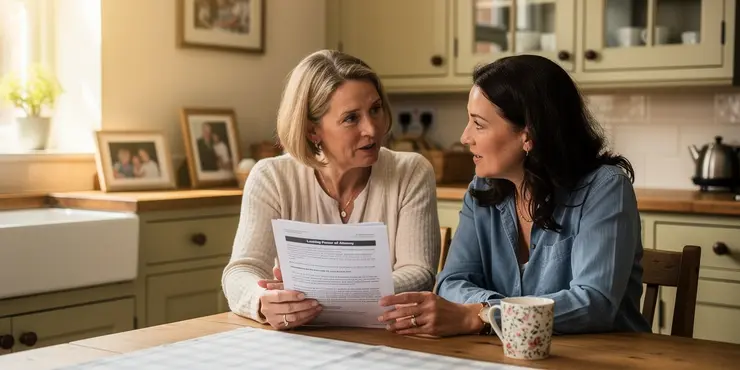
Find Help
More Items From Ergsy search
-
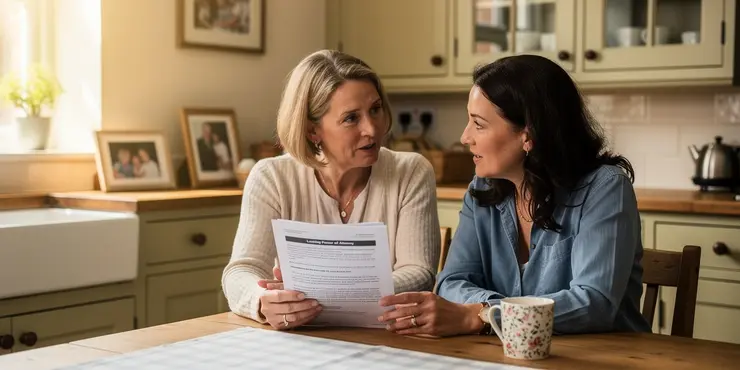
What is a Lasting Power of Attorney?
Relevance: 100%
-
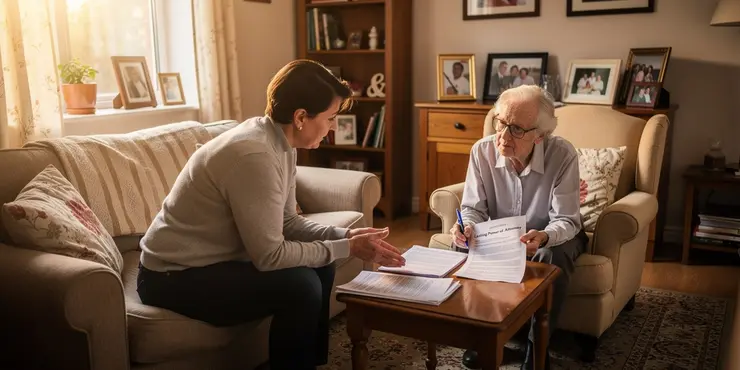
What is a lasting Power of Attorney?
Relevance: 97%
-
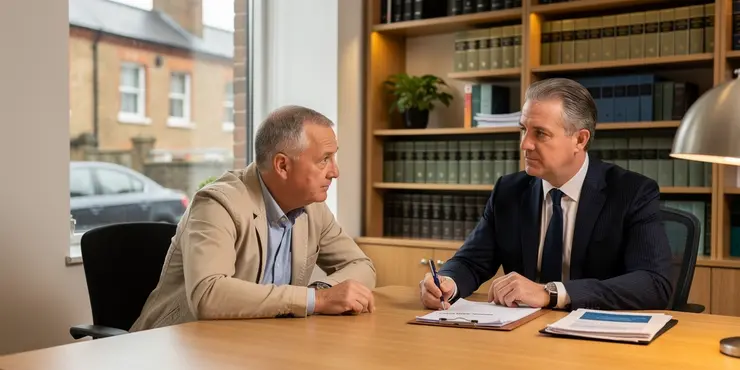
What are the types of Lasting Power of Attorney?
Relevance: 93%
-
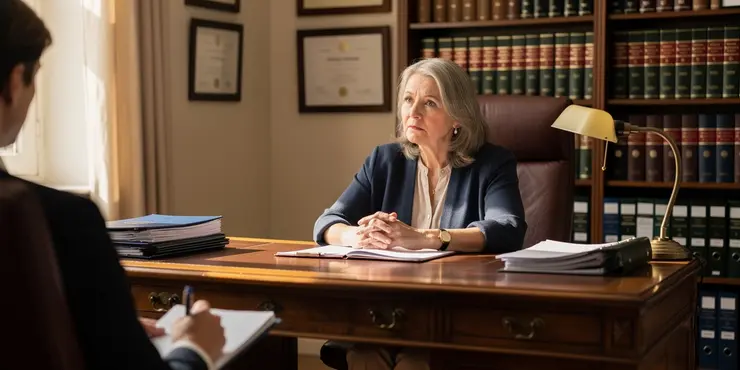
Court of Protection and lasting power of attorney.
Relevance: 91%
-
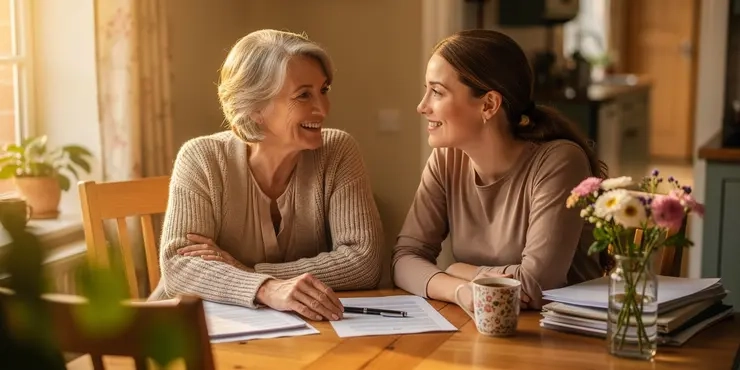
Lasting Power of Attorney UK - A 2023 Guide
Relevance: 91%
-
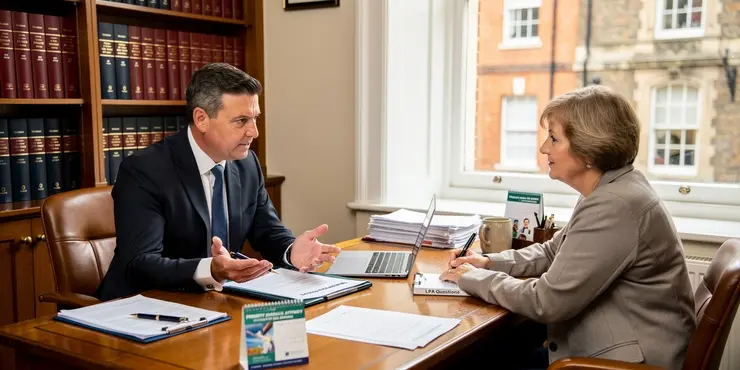
What are the types of Lasting Power of Attorney (LPA)?
Relevance: 91%
-
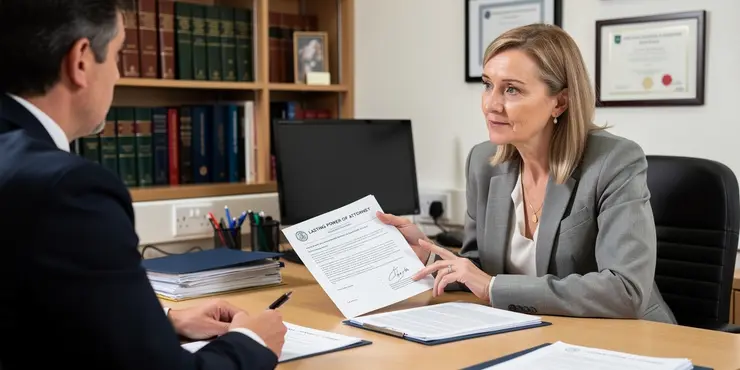
How to Set Up a Lasting Power of Attorney
Relevance: 88%
-
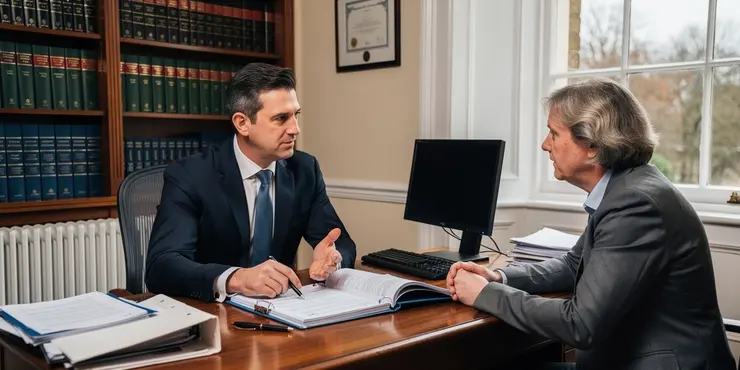
What is a Power of Attorney?
Relevance: 86%
-
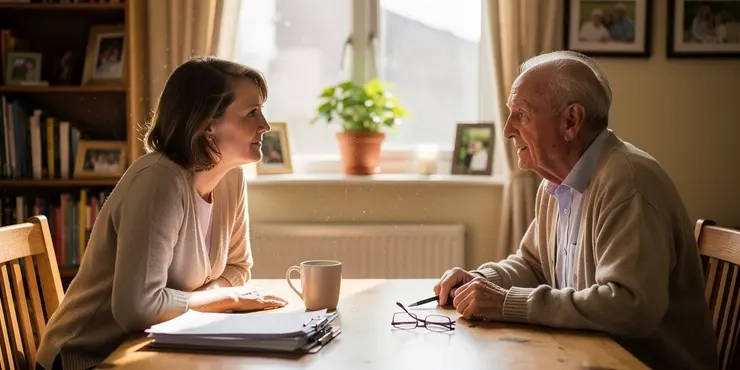
What Is A Power of Attorney
Relevance: 84%
-
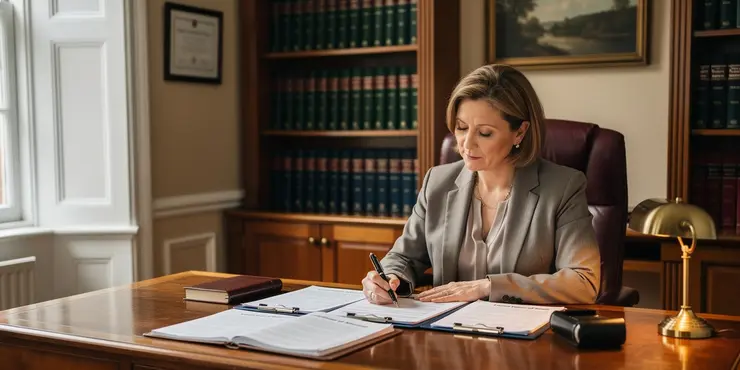
How do I set up a Lasting Power of Attorney?
Relevance: 83%
-

Is a lawyer needed to set up a Lasting Power of Attorney (LPA)?
Relevance: 81%
-
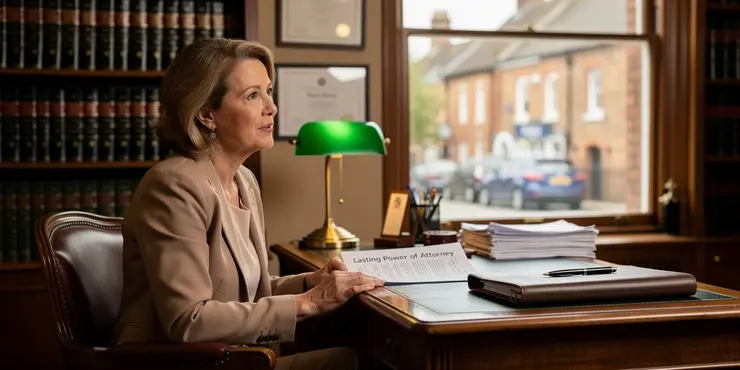
Who can be appointed as an attorney under a Lasting Power of Attorney?
Relevance: 81%
-

Why is an Lasting Power of Attorney (LPA) important?
Relevance: 81%
-

What is the role of the Office of the Public Guardian in regards to a Lasting Power of Attorney (LPA)?
Relevance: 77%
-
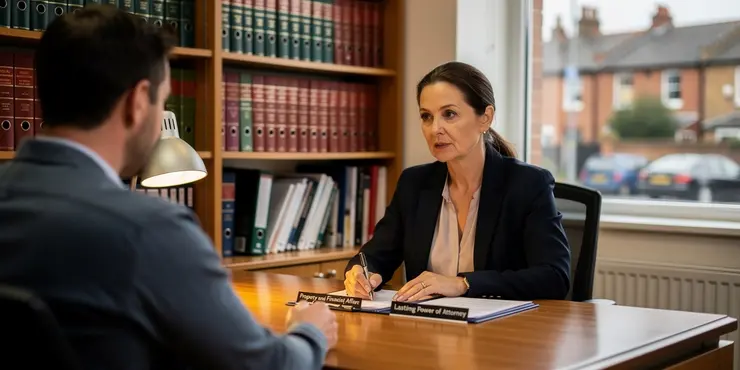
What decisions can an attorney make under a Property and Financial Affairs Lasting Power Attorney?
Relevance: 74%
-
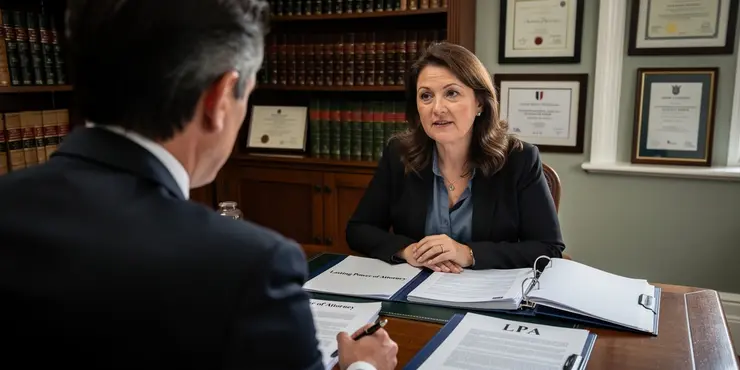
When does a Lasting Power of Attorney (LPA) come into effect?
Relevance: 73%
-

How do attorneys with Lasting Power of Attorney make decisions if there's more than one?
Relevance: 70%
-
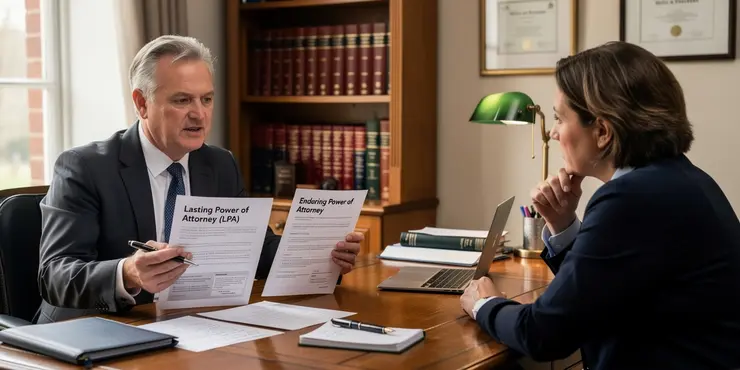
How does an LPA differ from an Enduring Power of Attorney?
Relevance: 67%
-

Are there costs involved in setting up an Lasting Power of Attorney (LPA)?
Relevance: 66%
-

What powers does an attorney have in a Health and Welfare LPA?
Relevance: 64%
-

What happens if the attorney with lasting power of attorney does not act in my best interests?
Relevance: 63%
-
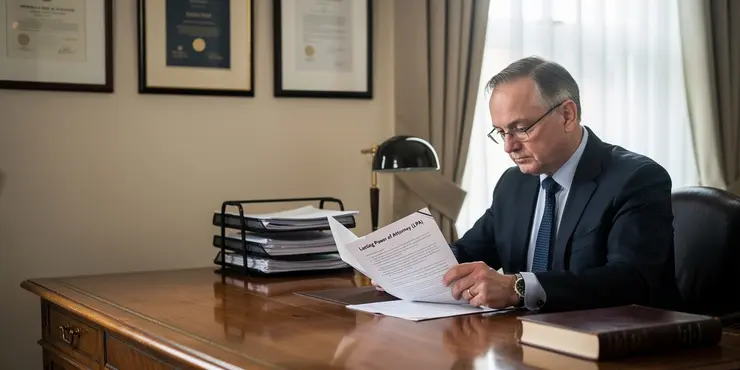
What are the restrictions on attorneys under an LPA?
Relevance: 52%
-

Can I have more than one attorney in an LPA?
Relevance: 50%
-
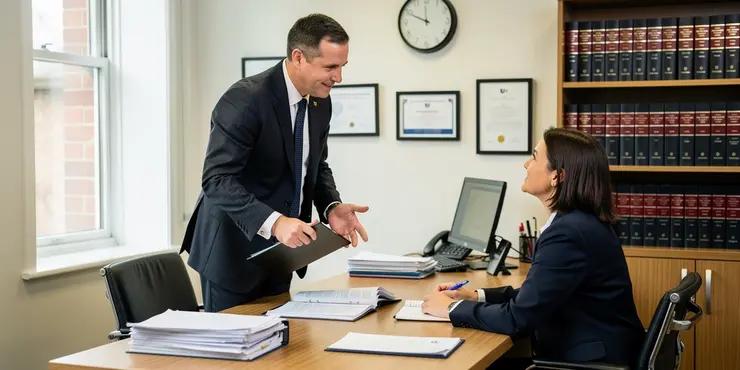
Can the Chief Law Officer for England and Wales overrule a court?
Relevance: 33%
-

Can the Chief Law Officer for England and Wales intervene in a legal case?
Relevance: 31%
-
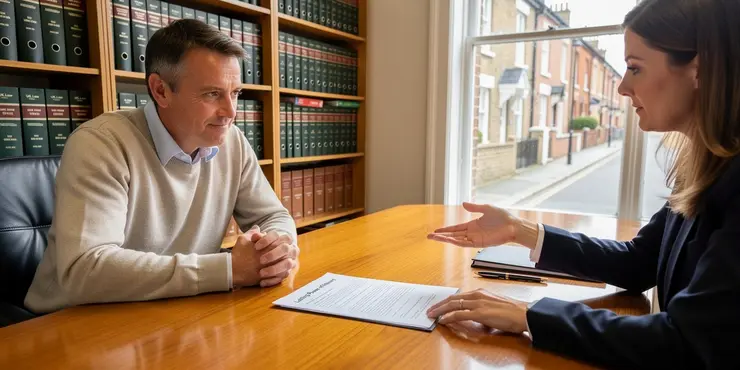
Can an LPA be used while I still have mental capacity?
Relevance: 31%
-

Can the Chief Law Officer for England and Wales make decisions on public prosecution matters?
Relevance: 31%
-
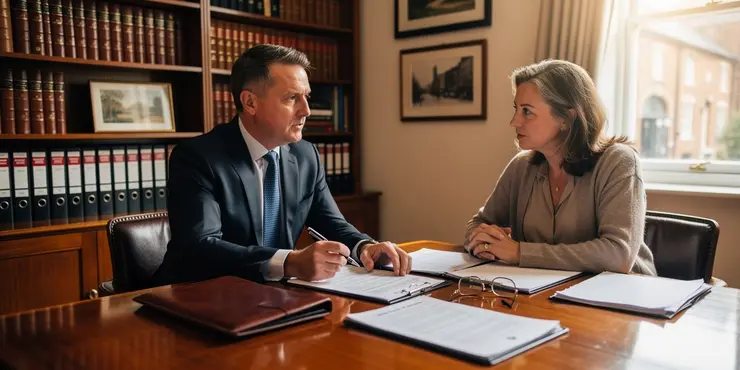
Is it necessary to have both types of LPAs?
Relevance: 31%
-
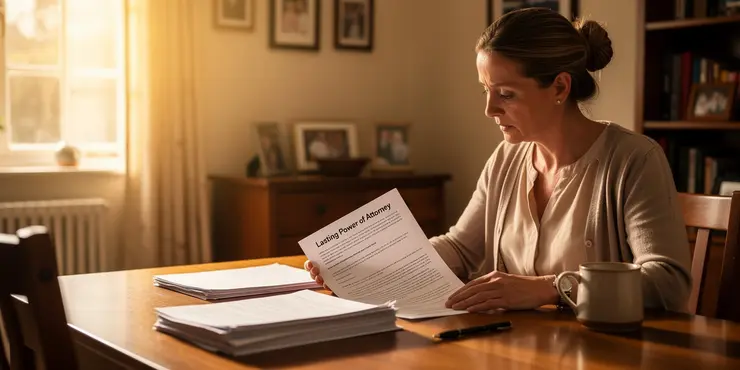
What legal resources are available for carers of Alzheimer's patients?
Relevance: 30%
-
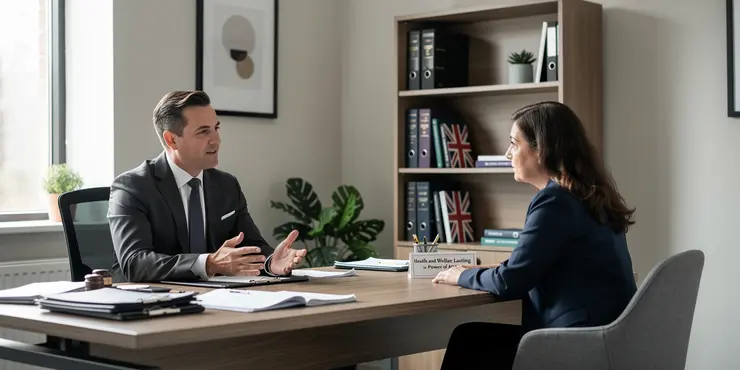
What powers does an attorney have in a Health and Welfare LPA?
Relevance: 29%
-
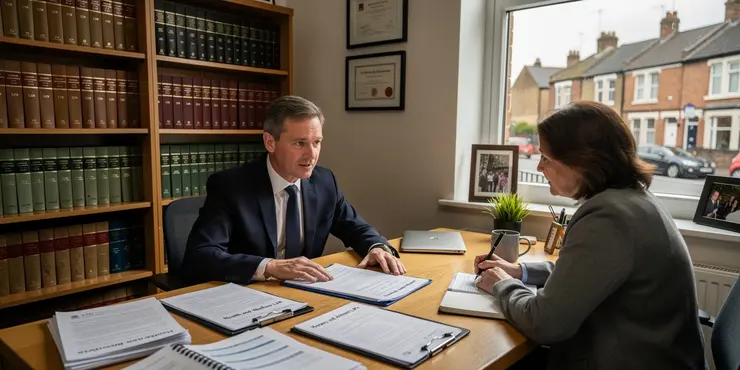
What powers does an attorney have in a Health and Welfare LPA?
Relevance: 29%
-
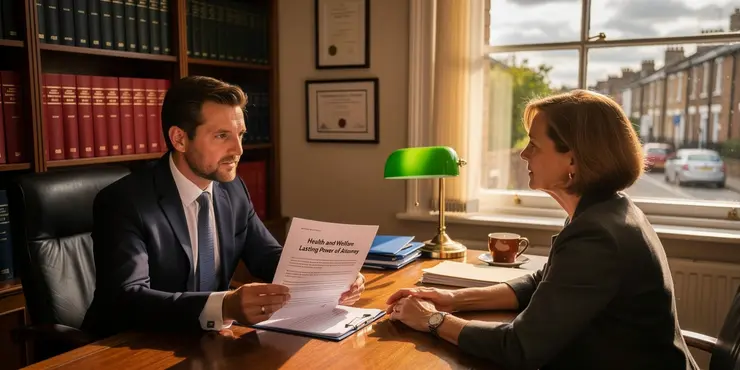
What powers does an attorney have in a Health and Welfare LPA?
Relevance: 29%
-
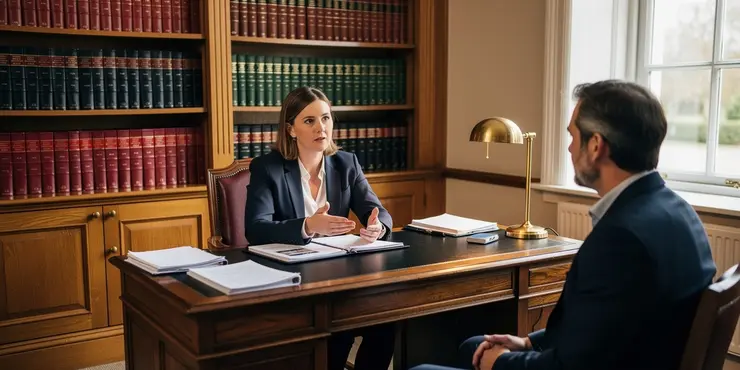
What powers does an attorney have in a Health and Welfare LPA?
Relevance: 29%
-

Can an LPA be changed or revoked?
Relevance: 28%
-
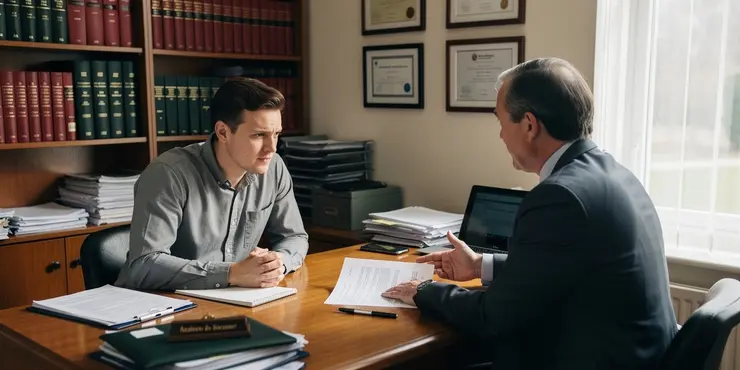
Is the position of the Chief Law Officer for England and Wales unique to the UK?
Relevance: 25%
-

How does the Chief Law Officer for England and Wales relate to the judiciary?
Relevance: 25%
-
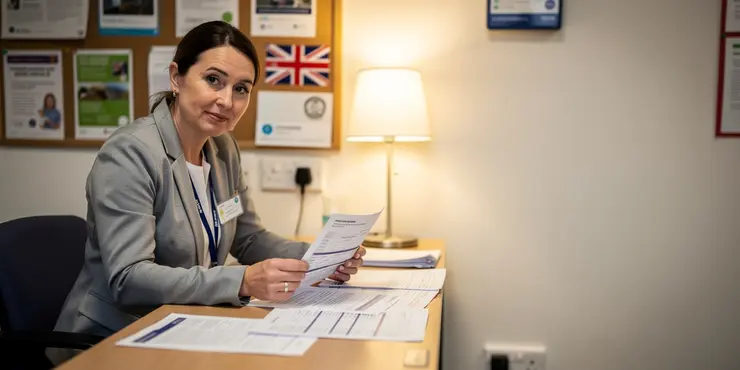
Can I apply for the payment for someone else?
Relevance: 25%
-
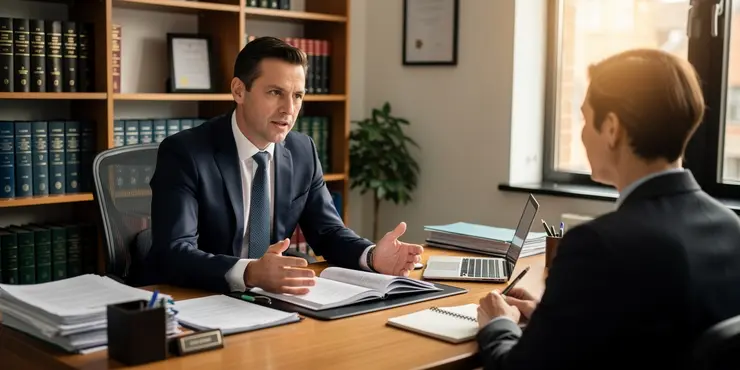
Does the Chief Law Officer for England and Wales in the UK handle prosecution cases?
Relevance: 24%
-

Can my attorney check my immigration status for me?
Relevance: 24%
-

How is the Chief Law Officer for England and Wales involved in the legislative process in the UK?
Relevance: 24%
What is a Lasting Power of Attorney?
A Lasting Power of Attorney (LPA) is a legal document in the UK that allows an individual, known as the ‘donor’, to appoint one or more people, known as ‘attorneys’, to make decisions on their behalf if they lose mental capacity or no longer wish to make decisions for themselves. The LPA is an essential tool in planning for the future, ensuring that one’s affairs are handled by trusted individuals.
Types of Lasting Power of Attorney
There are two main types of LPA in the UK: Health and Welfare, and Property and Financial Affairs. The Health and Welfare LPA allows the attorney to make decisions about the donor’s healthcare, living arrangements, and daily routine. This type of LPA only comes into effect when the donor lacks the capacity to make these decisions themselves. The Property and Financial Affairs LPA, on the other hand, covers decisions related to money, property, and investments. It can be used as soon as it is registered, with the donor’s permission, or when the donor loses mental capacity.
How to Make a Lasting Power of Attorney
To create an LPA, the donor must complete the necessary forms from the Office of the Public Guardian (OPG). These forms require detailed information about both the proposed attorneys and any instructions or preferences the donor wants to include. The completed forms must then be signed by a certificate provider, who verifies that the donor understands the implications of an LPA, and by the attorneys themselves. Once signed, the LPA must be registered with the OPG before it can be used.
Who Can Be an Attorney?
An attorney can be a family member, friend, or a professional such as a solicitor. It is crucial that the person chosen is trustworthy, as they will have significant control over important aspects of the donor’s life. An attorney must be over 18 and have the mental capacity to make decisions. When selecting attorneys, the donor should consider appointing more than one, and specify whether they must act jointly or can act independently.
The Importance of a Lasting Power of Attorney
An LPA provides peace of mind, ensuring that personal wishes are respected if an individual becomes unable to make decisions themselves. Without an LPA, friends or family may face lengthy and costly court procedures to gain the authority to manage someone’s affairs. Therefore, setting up an LPA is a proactive step in safeguarding one’s future and maintaining control over personal, financial, and medical decisions through trusted individuals.
What is a Lasting Power of Attorney?
A Lasting Power of Attorney (LPA) is a special paper in the UK. It lets someone you trust, called an ‘attorney’, make choices for you if you can’t decide for yourself or don't want to anymore. This helps make sure your things are looked after by people you trust.
Types of Lasting Power of Attorney
There are two kinds of LPA in the UK: Health and Welfare, and Property and Financial Affairs. A Health and Welfare LPA lets your attorney decide about your health, where you live, and your daily care. This one only works if you can't decide for yourself. A Property and Financial Affairs LPA lets your attorney handle your money, home, and things like that. It can be used when you say it’s okay, or if you can’t make decisions anymore.
How to Make a Lasting Power of Attorney
To make an LPA, you need to fill out forms from the Office of the Public Guardian (OPG). You write down who will be your attorney and any special wishes you have. Then, someone called a certificate provider needs to check that you understand everything. This person and your attorney must sign the forms. After that, the forms need to be registered with the OPG to be used.
Who Can Be an Attorney?
An attorney can be someone in your family, a friend, or a professional like a lawyer. This person should be someone you trust a lot because they will make important choices for you. They must be over 18 and able to make decisions. You can pick more than one attorney and say if they can decide things together or separately.
The Importance of a Lasting Power of Attorney
An LPA is important because it makes sure your wishes are followed if you can’t decide for yourself. Without an LPA, your family might need to go to court to manage your things, which can take a lot of time and money. Making an LPA helps make sure the right people can look after your personal, money, and health choices.
Frequently Asked Questions
What is a Lasting Power of Attorney?
A Lasting Power of Attorney (LPA) is a legal document that allows someone to appoint another person to make decisions on their behalf should they lose the capacity to make decisions themselves.
What are the types of Lasting Power of Attorney?
There are two types of LPA: one for Health and Welfare, and another for Property and Financial Affairs.
Who can be appointed as an attorney under an LPA?
Anyone over the age of 18 can be appointed as an attorney, including a spouse, family member, friend, or a professional such as a solicitor.
Can I have more than one attorney in an LPA?
Yes, you can appoint more than one attorney and specify whether they make decisions independently or together.
How does an LPA differ from an Enduring Power of Attorney?
An LPA can cover both health and financial decisions, whereas an Enduring Power of Attorney, which was replaced in 2007, covered only property and financial matters.
What happens if I lose mental capacity and do not have an LPA?
If you lose mental capacity and do not have an LPA, a court application may be necessary to appoint someone to manage your affairs, which can be costly and time-consuming.
How do I set up a Lasting Power of Attorney?
To set up an LPA, you must complete the LPA forms and register them with the relevant government office, such as the Office of the Public Guardian in England and Wales.
Can an LPA be changed or revoked?
Yes, as long as you have mental capacity, you can change or revoke an LPA. Once you lose capacity, it cannot be changed.
What is the role of the Office of the Public Guardian in regards to an LPA?
The Office of the Public Guardian registers LPAs and oversees the actions of attorneys to protect those who lack capacity.
Is it necessary to have both types of LPAs?
While it's not necessary, having both types ensures that all your affairs are covered, both health and financial.
What powers does an attorney have in a Health and Welfare LPA?
In a Health and Welfare LPA, attorneys can make decisions about medical treatment, living arrangements, and daily care routines but only when the person lacks capacity.
What decisions can an attorney make under a Property and Financial Affairs LPA?
Attorneys can make decisions about finances, such as managing bank accounts, paying bills, and selling property, often even if the person still has capacity.
What happens if the attorney does not act in my best interests?
If an attorney does not act in your best interests, the Office of the Public Guardian can investigate and may remove them.
Are there costs involved in setting up an LPA?
Yes, there are fees for registering an LPA, though fee reductions or exemptions are available for those with low income or on certain benefits.
Why is an LPA important?
An LPA is important as it ensures that your wishes about your care and finances are respected and that decisions are made by people you trust if you lose capacity.
What are the restrictions on attorneys under an LPA?
Attorneys must always act honestly and in your best interests, and any restrictions stated in the LPA must be followed.
How do attorneys make decisions if there's more than one?
You can specify if attorneys should act jointly, where all must agree, or 'jointly and severally', where they can also act individually.
Can an LPA be used while I still have mental capacity?
A Property and Financial Affairs LPA can be used with your permission while you have capacity, but a Health and Welfare LPA can only be used if you lack capacity.
Is a lawyer needed to set up an LPA?
It is not necessary to use a lawyer, as you can complete the forms yourself, although some people prefer to seek legal advice.
When does an LPA come into effect?
An LPA for Property and Financial Affairs can come into effect once registered, with your consent, while an LPA for Health and Welfare only comes into effect when you lack capacity.
What is a Lasting Power of Attorney?
A Lasting Power of Attorney (LPA) is a document.
This document lets you choose someone to help you make decisions.
This person is called an "attorney." They can help with things like money and health.
You can choose someone you trust, like a family member or a friend.
This is important if you get sick or can't make decisions by yourself.
It's good to talk to an adult or use pictures to understand more.
A Lasting Power of Attorney (LPA) is a paper that lets someone choose another person to help make choices for them if they can't do it themselves anymore.
What are the kinds of Lasting Power of Attorney?
A Lasting Power of Attorney (LPA) is a legal paper. It lets someone you trust help you make decisions. There are two main kinds of LPA:
- Health and Care LPA: This is for personal health and care choices, like doctors and daily care.
- Property and Money LPA: This is for money and things you own, like paying bills and managing your home.
You can choose one kind or both types of LPA.
If you find this confusing, ask someone you trust to help. You can also use tools to explain more, like videos or picture guides.
There are two kinds of LPA:
One is for Health and Welfare.
The other is for Money and Property.
Who can be chosen to help you with your LPA?
An LPA lets someone you trust help you make decisions. This person is called an 'attorney'.
You can pick a family member or a friend. They should be 18 or older. They need to understand what you want and be someone you trust.
If you need help picking someone, ask a friend or family member for advice.
If you are 18 or older, you can choose someone to help make decisions for you. This person is called an attorney. It can be your husband or wife, someone in your family, a friend, or even a lawyer.
Can I have more than one helper in an LPA?
Yes, you can choose more than one person to help you with your LPA. This means more people can look after your things. It is important to pick people you trust.
You can talk to someone you trust or use picture cards to help you understand how it works.
Yes, you can choose more than one person to be your helper. You can decide if they should make choices alone or work together.
What is the difference between an LPA and an Enduring Power of Attorney?
An LPA and an Enduring Power of Attorney are both ways to let someone help you make decisions.
An LPA is a newer version. It has more rules to protect you.
An Enduring Power of Attorney is older. It was made before October 2007.
It's important to know which one you have. You can ask a trusted adult for help.
You can also use pictures or watch a video to understand better.
An LPA helps people make decisions about health and money. The old kind, called an Enduring Power of Attorney, only helped with money and things you own. The new LPA can help with both. If you need help reading or understanding things, it can be useful to ask someone you trust to explain. You can also use tools like a dictionary or apps that read text out loud.
What if I can't make decisions and I don't have an LPA?
If you can't make decisions for yourself and don't have an LPA (a paper that says who can help you), then a court might have to choose someone to help you. This can take a long time and cost a lot of money.
How do I make a Lasting Power of Attorney?
A Lasting Power of Attorney (LPA) is when you ask someone you trust to help you make big decisions. Here is how you can do it:
- Pick someone you trust. This person is called your 'attorney'.
- Fill in a form. You can ask for help with the form if you need it.
- Sign the form to say you agree.
- Register the form. This makes it official.
You can use tools like voice assistants or screen readers to help you understand each step. Always ask for help when you need it.
To make an LPA, you need to fill out the LPA forms. Then, you need to take them to the right government office. In England and Wales, this is the Office of the Public Guardian.
Can an LPA be changed or stopped?
Yes, you can change or cancel an LPA if your mind is healthy. When your mind is not healthy, you can't change it.
What does the Office of the Public Guardian do with an LPA?
The Office of the Public Guardian, or OPG, helps make sure people are safe with an LPA. LPA stands for Lasting Power of Attorney. It's a way to let someone else make decisions for you if you can't.
The OPG gives the OK and keeps a list of all LPAs. They make sure the people making decisions for others do good things.
If you want to know more or need help, you can call or email the OPG. It’s like asking a teacher if you have questions.
Helpful tools or ideas: Ask a family member or friend for help understanding. You can also use special apps that read text out loud.
The Office of the Public Guardian helps make sure people who cannot make decisions for themselves are protected. They check on the people who have permission to make decisions for them.
Do you need both kinds of LPAs?
You don't have to have both, but having both makes sure all your health and money needs are taken care of.
What Can an Attorney Do in a Health and Welfare LPA?
An attorney is someone who helps you make decisions. In a Health and Welfare LPA, they help with your health and care. Here’s what they can do:
- Help decide where you live, like at home or in a care home.
- Decide what you eat and drink.
- Make choices about your medical care, like going to the doctor.
- Decide who can visit you.
- Help with your daily routine, like washing and dressing.
If you are helping someone, use pictures or simple words to explain. A family member or friend can also help understand this better.
When someone cannot make decisions on their own, a Health and Welfare LPA lets someone they trust help them. This person can choose things like where they live, what medical care they get, and how they are looked after each day.
What Can a Lawyer Do with a Property and Money LPA?
An LPA is a paper that lets someone help you with your things and money. LPA means Lasting Power of Attorney.
Here is what a lawyer can do for you with this paper:
- Pay your bills.
- Look after your money.
- Sell your house if you need to.
- Make sure you have what you need.
If you don’t understand, ask someone to explain. Using picture cards or speaking apps can help you understand better.
Lawyers can help with money. They can take care of bank accounts, pay bills, and sell things like houses. They can do this even if the person can still make decisions.
What if the attorney does not help me?
If a lawyer does not help you properly, the Office of the Public Guardian can check and might stop them from working for you.
Do you have to pay to set up an LPA?
It costs money to set up an LPA (Lasting Power of Attorney).
When you make an LPA, you fill out forms and pay fees. The fees are for checking and registering the LPA.
If you need help, you can ask someone you trust. You can also use tools like videos or websites to understand more.
Yes, you have to pay when you register an LPA. But if you don’t have much money or get some benefits, you might pay less or nothing.
Why is an LPA important?
An LPA is important because it helps people when they cannot make decisions.
Sometimes, people get very sick or hurt and need help. The LPA lets you choose someone you trust to help make decisions for you.
This way, you know you have someone to help when you need it.
If it is hard to understand, ask a friend or carer to explain it to you. They can read it with you and help you understand better.
An LPA is important. It makes sure that your wishes about your care and money are followed. If you can't make decisions, people you trust will help you.
What can lawyers not do with an LPA?
A lawyer is someone who helps you with legal things. LPA stands for Lasting Power of Attorney. This is a paper that lets a lawyer help you make decisions if you can't make them yourself.
There are some things a lawyer cannot do with an LPA:
- They cannot make choices that you have not allowed them to make.
- They cannot do anything that is against the law.
- They must always do what is best for you.
It is important for your lawyer to know the rules.
If you find it hard to read, here are some tools you can try:
- Text-to-speech tools that read words out loud.
- Highlight keywords to make important points stand out.
- Use tools that explain words you don’t know.
Lawyers must always tell the truth and do what is best for you. They must also follow any rules written in the LPA.
How do lawyers make choices if there is more than one?
When there is more than one lawyer, they need to work together to make a choice. Here are some simple ways to help:
- Talk and Listen: Lawyers can talk with each other and listen to ideas.
- Vote: They can vote to see what most people agree on.
- Set Rules: They can make rules about how to decide together.
If you find this difficult, you can ask someone to help explain or use a voice assistant to read it to you.
You can choose if you want all your helpers (attorneys) to make decisions together, or if they can also make decisions by themselves.
Can you use an LPA when you can still make decisions?
A Property and Money LPA can be used if you say it's okay, and you can still make decisions. But a Health and Care LPA can only be used if you can't make decisions.
Do I need a lawyer to make an LPA?
An LPA is a paper that lets someone make choices for you. You do not have to have a lawyer to make it.
You can ask a trusted person to help fill in the forms. If you need help, you can:
- Use online guides
- Watch videos that show what to do
- Get help from family or friends
If you are unsure or want more advice, talking to a lawyer can be a good idea.
You do not have to use a lawyer. You can fill out the forms by yourself. But some people like to ask a lawyer for help.
When does an LPA start working?
An LPA, or Lasting Power of Attorney, starts working when you need help making decisions. This happens if you cannot make decisions by yourself. This can be because you are not well. Make sure people know that you need help.
It's good to talk to someone like a family member or friend. They can help you understand. Using pictures or simple words can make it easier. You can also use apps or tools that read things out loud. This can help you know what an LPA does.
A Property and Financial Affairs LPA can start working after it is registered, if you agree. A Health and Welfare LPA starts working if you can't make decisions for yourself.
Useful Links
This website offers general information and is not a substitute for professional advice.
Always seek guidance from qualified professionals.
If you have any medical concerns or need urgent help, contact a healthcare professional or emergency services immediately.
Some of this content was generated with AI assistance. We’ve done our best to keep it accurate, helpful, and human-friendly.
- Ergsy carfully checks the information in the videos we provide here.
- Videos shown by Youtube after a video has completed, have NOT been reviewed by ERGSY.
- To view, click the arrow in centre of video.
- Most of the videos you find here will have subtitles and/or closed captions available.
- You may need to turn these on, and choose your preferred language.
- Go to the video you'd like to watch.
- If closed captions (CC) are available, settings will be visible on the bottom right of the video player.
- To turn on Captions, click settings .
- To turn off Captions, click settings again.
More Items From Ergsy search
-

What is a Lasting Power of Attorney?
Relevance: 100%
-

What is a lasting Power of Attorney?
Relevance: 97%
-

What are the types of Lasting Power of Attorney?
Relevance: 93%
-

Court of Protection and lasting power of attorney.
Relevance: 91%
-

Lasting Power of Attorney UK - A 2023 Guide
Relevance: 91%
-

What are the types of Lasting Power of Attorney (LPA)?
Relevance: 91%
-

How to Set Up a Lasting Power of Attorney
Relevance: 88%
-

What is a Power of Attorney?
Relevance: 86%
-

What Is A Power of Attorney
Relevance: 84%
-

How do I set up a Lasting Power of Attorney?
Relevance: 83%
-

Is a lawyer needed to set up a Lasting Power of Attorney (LPA)?
Relevance: 81%
-

Who can be appointed as an attorney under a Lasting Power of Attorney?
Relevance: 81%
-

Why is an Lasting Power of Attorney (LPA) important?
Relevance: 81%
-

What is the role of the Office of the Public Guardian in regards to a Lasting Power of Attorney (LPA)?
Relevance: 77%
-

What decisions can an attorney make under a Property and Financial Affairs Lasting Power Attorney?
Relevance: 74%
-

When does a Lasting Power of Attorney (LPA) come into effect?
Relevance: 73%
-

How do attorneys with Lasting Power of Attorney make decisions if there's more than one?
Relevance: 70%
-

How does an LPA differ from an Enduring Power of Attorney?
Relevance: 67%
-

Are there costs involved in setting up an Lasting Power of Attorney (LPA)?
Relevance: 66%
-

What powers does an attorney have in a Health and Welfare LPA?
Relevance: 64%
-

What happens if the attorney with lasting power of attorney does not act in my best interests?
Relevance: 63%
-

What are the restrictions on attorneys under an LPA?
Relevance: 52%
-

Can I have more than one attorney in an LPA?
Relevance: 50%
-

Can the Chief Law Officer for England and Wales overrule a court?
Relevance: 33%
-

Can the Chief Law Officer for England and Wales intervene in a legal case?
Relevance: 31%
-

Can an LPA be used while I still have mental capacity?
Relevance: 31%
-

Can the Chief Law Officer for England and Wales make decisions on public prosecution matters?
Relevance: 31%
-

Is it necessary to have both types of LPAs?
Relevance: 31%
-

What legal resources are available for carers of Alzheimer's patients?
Relevance: 30%
-

What powers does an attorney have in a Health and Welfare LPA?
Relevance: 29%
-

What powers does an attorney have in a Health and Welfare LPA?
Relevance: 29%
-

What powers does an attorney have in a Health and Welfare LPA?
Relevance: 29%
-

What powers does an attorney have in a Health and Welfare LPA?
Relevance: 29%
-

Can an LPA be changed or revoked?
Relevance: 28%
-

Is the position of the Chief Law Officer for England and Wales unique to the UK?
Relevance: 25%
-

How does the Chief Law Officer for England and Wales relate to the judiciary?
Relevance: 25%
-

Can I apply for the payment for someone else?
Relevance: 25%
-

Does the Chief Law Officer for England and Wales in the UK handle prosecution cases?
Relevance: 24%
-

Can my attorney check my immigration status for me?
Relevance: 24%
-

How is the Chief Law Officer for England and Wales involved in the legislative process in the UK?
Relevance: 24%


